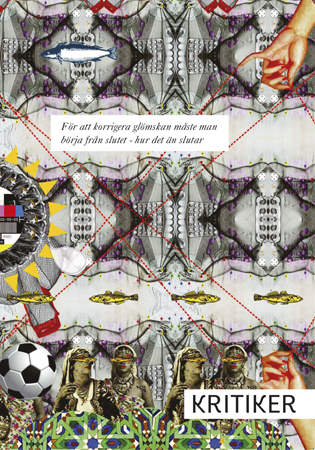(THIS ARTICLE IS MACHINE TRANSLATED by Google from Norwegian)
In April, a new issue of the journal was published critic (#47) with the somewhat enigmatic title: "To correct forgetfulness, one must start from the end – however it ends," and p. 79 it turns out to be from the first lines of a poem by Algerian poet Samira Negrouche, co-editor of this issue of the past, languages and Algerian women. Co-editor with Sarra Anaya, Ida Börjel and Ylva Gripfelt, among others.

Women in battle. The kaleidoscopic collage, which adorns the cover of #47, is signed by Brokk'art and Hania Zaazoua, and there are also some examples of this kind of image-quoting montage inside the issue. It is ambiguous between the cocoa iconic and the serial, and the same ambiguity also distinguishes the entire composition of the song. The female author voice dominates poems and conversations altogether, but the topics are not only the isolation of this voice in Algeria, its past and its emotions, but also the testimony these poems and conversations can bring to the reader in the world: first of all, the long and very bloody struggle for emancipation from the French colonial power, in which female partisans played a crucial role, as my generation remembers from Gillo Pontecorvo's docufiction La battaglia di Algeri from 1966. And it is also one of the heroines of the battle, Zohra Drif, who begins the number and ends it in the form of a letter addressed to her by the French philosopher Hélène Cixous. Next, the relationship between memories and the languages that convey memories and the voices involved, not least the mothers and thus the native languages. The song has a feel for the game between Algerian Arabic and Algerian Berber: The written language of the latter language tamazight has a long and tumultuous development, whose melancholy complements the mood of Algerian-Arabic poetry in this issue.
Swedish-born rebirth. Together with the long, almost incessant settlement of the post-colonial settlement that takes place in the texts, it is probably the languages that sound especially to the inner ear when the reading is over. The Swedish translators have managed to pass on something very special here: for though it is the French who secure the passage from the Arabic-Algerian spoken language and tamazight to Swedish, and although precisely French is problematized in many contributions such as the language of domination and the metropolis, so will the translation into Swedish a bit of a rebirth and a way in which a literature that has emerged as "prison poetry" (p. 68) and whose female practitioners have had to fight and continue to struggle with a lack of "own space" in public of the melancholy temptations with their claustrophobic after effects. Translation is a way out, a door to the world.
[/ ihc-hide-content]


